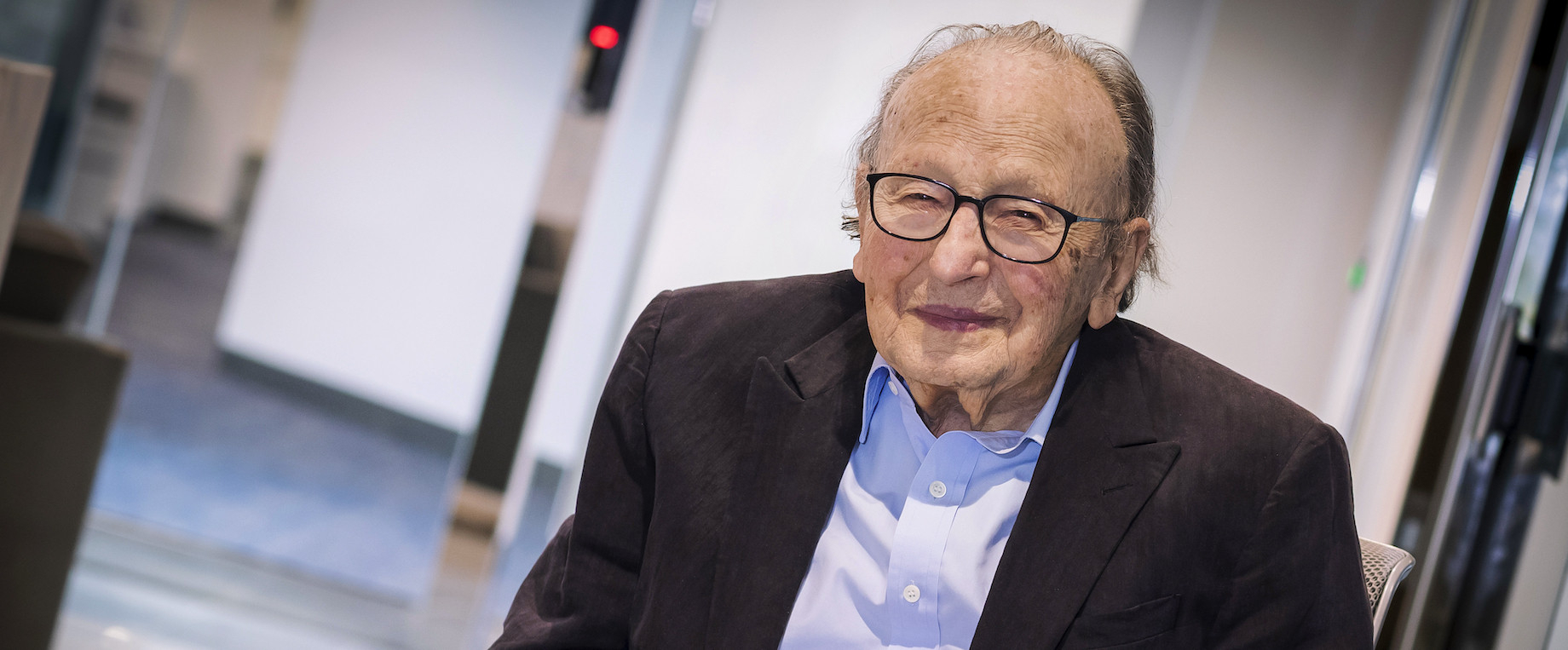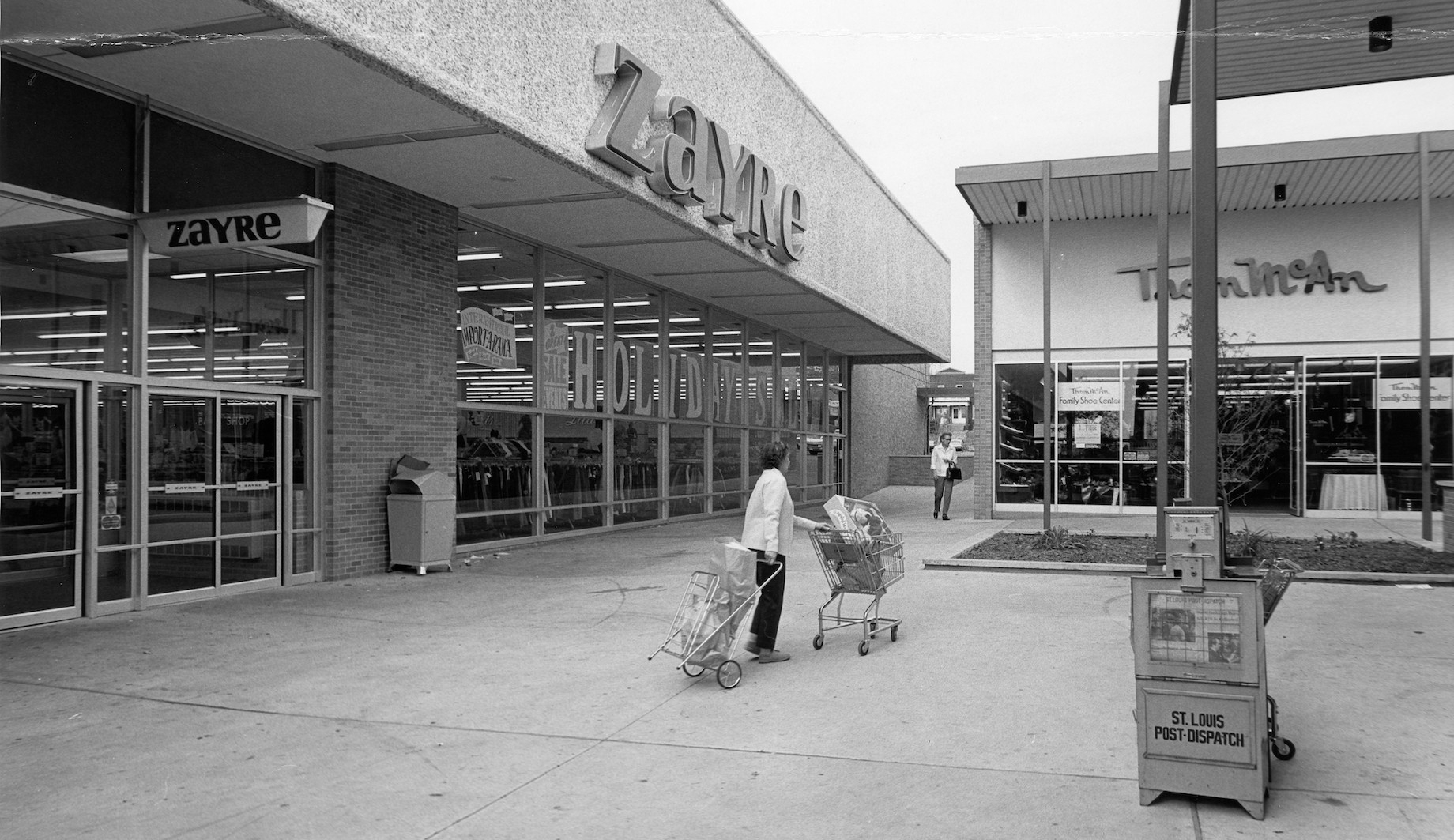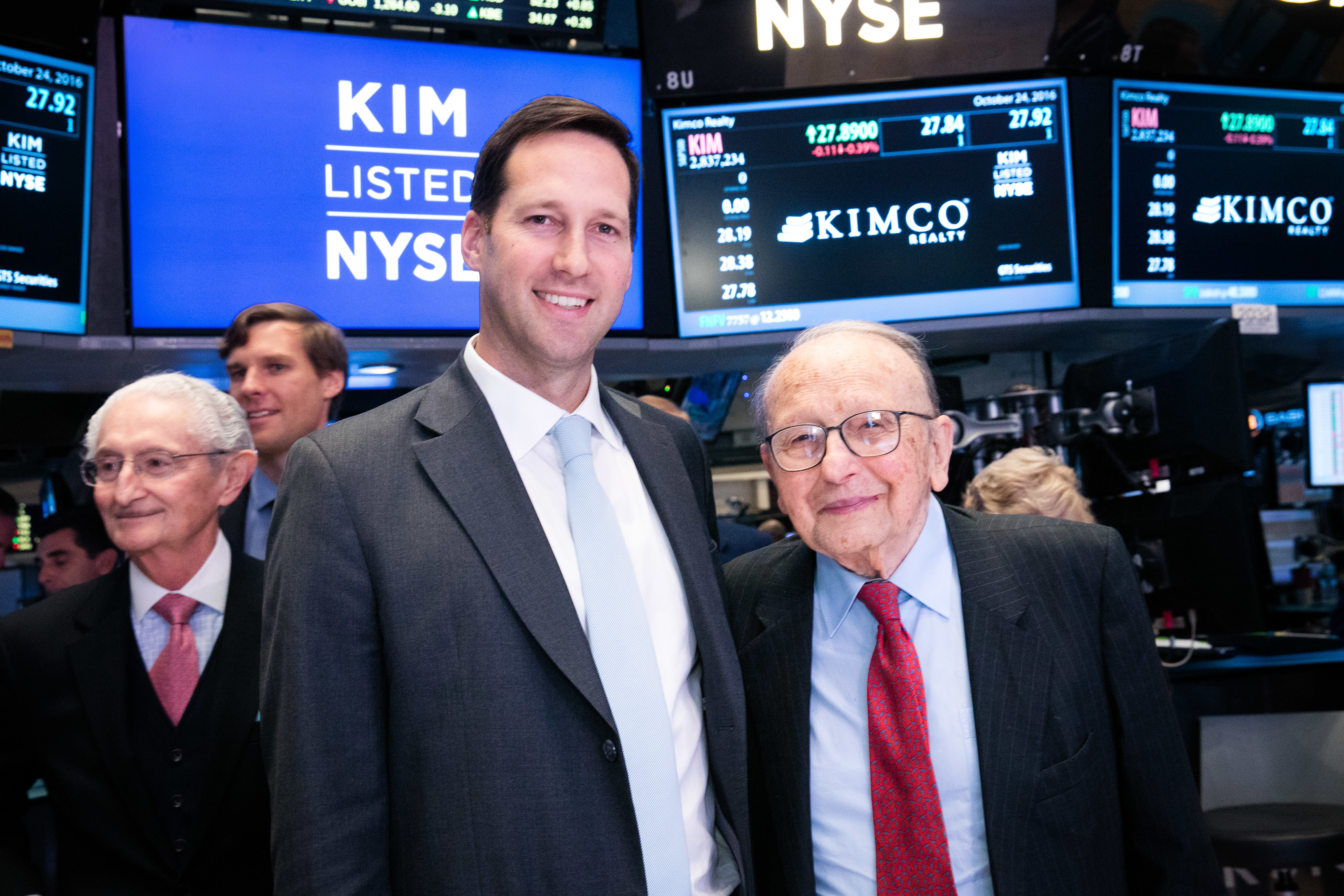Few in American retail lore have had a greater impact on the industry than humble icon Milton Cooper.
Cooper, co-founder of REIT Kimco Realty, the nation’s largest publicly traded owner/operator of neighborhood and community shopping centers, is the man who made it possible for anyone who could spring for a share of stock to invest in commercial real estate, a phenomenon he calls the “democratization” of the REIT industry.

One part humanitarian, one part traditionalist and another part visionary, Cooper, at age 93, remains active as executive chair of his firm, perennially listed among the top places to work in the U.S.
Cooper is unlike anyone Kimco CEO Conor Flynn has ever met or likely will meet. “He looks you straight in the eye and into your soul and connects with you on a very deep level,” said Flynn. “You see a light going on in him and you’re just thankful to be in the same room.”
At a recent Kimco meeting, said Flynn, a speaker summarized the company culture perfectly by saying: “Regardless of who you’re talking with at Kimco, you are talking with Milton.” Flynn added: “His ideas and concepts have essentially launched an industry.”
The first thing you learn when talking with Cooper is what he wants to learn about you. Before getting on to business, the ever-curious Cooper is apt to ask what books you’re reading, where you’re from and how many children and siblings you have. Then, when your conversation comes to an end, he will beseech you to be well. “Not only does he have all this charisma and ability, he really does care about people,” remarked his grandson, Kimco president and chief investment officer Ross Cooper.
64 Years in the Business
Milton Cooper entered the business world in 1952 fresh out of Brooklyn Law School, but he soon soured on litigation as an avocation. “I found I didn’t like law,” he said. “I didn’t like billing, and I didn’t like that you had to be right 100% of the time or you could be gone.” Real estate, on the other hand, “is entertaining and entrepreneurial, and there are a lot of smart young people in it,” he said. “But what I really liked about the business is that you could earn money while you sleep.”
In 1958, Cooper built his first strip center, Coral Way Plaza in Miami, with friend and commercial-construction craftsman Martin Kimmel. “He was in Los Angeles, and I was in New York,” Cooper told Nareit’s REIT publication in 2021. “I called him and said: ‘I have these projects. Would you be interested in being a partner with me?’ He said: ‘I’ll be on the next plane.’” A handshake on Kimmel’s arrival cemented a deal that would create KIMCO Company that year, using the “Kim” in Kimmel and the “Co” in Cooper. To Nareit, Cooper described Kimmel, who passed away in 2008, as “a man with an entrepreneurial flair … who had a very good antenna for sizing up people.” Kimco still owns the original Coral Way center 64 years later.

Milton Cooper and Martin Kimmel co-founded Kimco Realty and built their first neighborhood center, Miami’s Coral Way Plaza, in 1958. Kimco still owns the property 64 years later.
Cooper made an early decision to steer clear from mall development. He was concerned that the mammoth mall department store anchors of the time eventually would bleed market share to retail specialists. Grocery-anchored centers, he recognized, were commodity based, stable and downturn resistant. In Kimco’s first two decades, the firm focused on ground-up development in Florida, moving on to Pennsylvania and Ohio in the 1980s as the firm diversified into acquisition and value-enhanced redevelopment.
At the time, most real estate investment trusts operated as “mortgage REITs,” which originated loans that were secured by real estate. But they struggled to raise capital and many failed, sometimes suddenly, giving the industry a jaded reputation. Then, the 1986 Tax Reform Act came along to create an even harsher environment, casting commercial real estate into a recession. Growth capital was scarce. “It was a time when capital was temperamental and REITs were trying all kinds of things to survive.” Cooper recalled. “What we wanted was non-temperamental capital.”
So in 1991, Cooper and company formulated an IPO using a radical, new “equity REIT” model. “It was still a very tough sell when we did it, even with an 8.6% dividend yield and a multiple of about 8 times our projected” funds from operations, Cooper recalled. Perceptions at the time that real estate had created the string of 1980s S&L failures didn’t help, even though, Cooper said, it actually was largely the failed long-term, fixed-rate mortgages that toppled thrifts. “But we still thought this strategy was a sensible thing to do because it was the beginning of the democratization of real estate ownership, the concept that smaller individuals could invest in commercial real estate just by buying shares,” he said.
The Kimco offering opened down the first few days but rebounded robustly to sell out in about two weeks, raising $120 million in capital. “When we first did our projections for it, they were very conservative,” Cooper recalled. “And after our [IPO] report came out, there were articles saying that the Kimco mantra was to underpromise and overperform. But that wasn’t so bad.”
Kimco’s underestimation proved to be a savvy move, REIT expert Ralph Block, author of Investing in REITs, said in a 2011 PBS profile on Cooper. Cooper “didn’t want to be a cheerleader for his company, so he would try to be realistic. But he knew that, based on the strength of his organization, they were likely to outperform what everyone expected.”

In 2016, on the 25th anniversary of Kimco Realty’s listing on the New York Stock Exchange, CEO Conor Flynn, co-founder and executive chair Milton Cooper and colleagues visited the NYSE to ring the closing bell.
As a stream of individual investment blended with a simultaneous infusion of new institutional capital, “the others REITs eventually came around,” Cooper recalled. Armed with fresh assets and enhanced borrowing capacity, Kimco and its equity REIT model became the envy of the industry, which saw more than 30 REIT and other IPOs over the next two years. Kimco’s strategy also allowed it to weather the 1990s credit crunch and to quadruple its square footage in less than a decade, from its 1991 IPO to 2000, making it the nation’s largest owner of grocery-anchored centers. Kimco now owns interests in 526 U.S. shopping centers and mixed-use assets totaling 91 million square feet of gross leasable area in 28 states.
Legacy: Equity REITs, Golden Rule, Family and Friends
Just how influential was Cooper’s REIT formula? From 1990 to year-end 1997, the REIT market’s equity valuation vaulted from $5.6 billion to $135 billion, according to a 1998 Wharton School of Business REIT study. More than 100 REITs were created in that span. REIT all-market cap stands at $1.2 trillion as of late October 2022, according to Nareit.
To this day, Kimco employees know to apply Cooper’s deeply ingrained and founding “golden rule” to every company relationship and operational strategy. “Ah, the golden rule,” Cooper said. “The smart-asses will say whoever has the gold makes the rules, but it’s really about having an interest in people and treating them the way you want to be treated; that’s the real golden rule.”
Though he doesn’t quite remember it, Cooper first met Shirley, his wife of 72 years, when he was 2 and she was 1. “We lived in the same apartment building on the Lower East Side, and she was my fire-escape neighbor. She became my girlfriend when I was 14 and she was 13.”
The couple have four sons, a dozen grandchildren and 13 great-grandchildren. Cooper relishes grandparenthood, he said. “What I like is that a grandchild and a grandparent have a common enemy,” he joked. The majority of Cooper’s close-knit, extended family lives almost in shouting distance of him.
As a child, grandson Ross Cooper recalls listening intently while his uncle, Ripco Real Estate co-founder Todd Cooper, talked shop with grandfather Milton at lively Friday night family dinners attended by cousins, uncles and siblings. But Ross Cooper was never more awestruck than during his high school and college days when he walked the halls of the annual RECon in Las Vegas with his famous grandfather. “It was like being next to Michael Jordan,” he recalled. “People would just light up and gather around him, and he remembered everyone by name. He has that gift, and he would always ask about their families.” Clearly, it wasn’t an act, Ross discerned.
When asked about the rare depth of such a large number of career-long business relationships, Milton Cooper was quick to correct. “It’s not relationships in business,” he said. “It’s relationships with people.”
But Milton Cooper is anything but a softy when it comes to the integrity of the company. As a senior in college, Ross Cooper witnessed firsthand the no-nonsense side of the family patriarch when he approached his granddad to inform him that he was having second thoughts about entering the sports industry and instead wanted to work at Kimco. The elder Cooper responded emphatically, as his grandson recalled: “Absolutely not. It can’t be you just getting a job because of nepotism; you’re not ready.” Taken aback, Ross devised a plan and soon headed to New York University to earn a challenging graduate degree in real estate. Even after that, Milton “reluctantly” hired him in 2006, Ross Cooper recalled. “In hindsight, of course, he was absolutely right.”
Simple View of a Complex Industry
Milton Cooper’s founding principles of nimbleness and diversification still reign through the Kimco portfolio, including the company’s recent expansion into multifamily and other mixed-use. It is an overriding philosophy that’s kept Kimco liquid in periods of industry turbulence, his grandson said.
Milton Cooper also built a reputation as a value-add wizard and always seems to sense innately how to enhance the worth of Kimco holdings to benefit shareholders and stakeholders, as business analysts and journalists have observed over the years. “For example, we started by looking at the retailers who were average operators but who had great real estate, and we bought a lot of them,” Cooper said. Kimco, for example, acquired a majority stake in more than 300 Montgomery Ward locations in 2001, liquidating inventory and retenanting the space, lining up deals with such retailers as Target, Kohl’s, May and Federated, Cooper said.
“His ideas and concepts have essentially launched an industry.”
Added Flynn: “Milton is never happy with the status quo and is always looking at ways to push the envelope. He believes that if you’re not trying to improve, you are going backward.”
Throughout his career, Cooper has applied an operational constant: “Simplicity is always better.” This tenet comes from the same man who possesses the knack of boiling down complex real estate strategies to make them understandable to all levels of investors and other stakeholders. Flynn offered an example: “If you look at fundamental real estate, the first question you ask is: Is the tenant paying below market rent or above market rent? If below, you’re in the real estate business. If it’s above market, then you’re in the credit or mezzanine loan business.” That type of simplicity is not always easy to impart, “especially today in the roller-coaster journey that retail has taken,” Flynn said. “But Milton does it.”
Humility and Humanity
One of Cooper’s best and most disarming personality traits, said Flynn, “is his uncanny lack of an ego.” Cooper’s greatest accomplishments over his storied career are too many to name, said Flynn. “However, I do know Milton is most proud of his impact on our communities, and that has always connected him to the industry.”
Cooper’s humanity remains deeply ingrained in the company, said Ross Cooper. “His golden rule applies to everyone at Kimco,” the grandson said. “We keep all of our people informed on our day-to-day operations and have regular all-employee calls. And everyone in the company knows to use that golden rule in every decision they make.”
It’s not surprising that Kimco unfailingly ranks among the U.S.’s top companies to work for each year. In its 2022 Best Workplaces in Real Estate report, The Great Place to Work Global Employee Engagement Study found that 94% of Kimco employees felt the company is a “great place to work,” compared with 57% for a typical U.S. firm.
The notoriously humble Milton Cooper shrugged off the notion that Kimco continues to succeed due to his guidance. “They are doing it on their own momentum,” he insisted. “The business is run exceptionally well by Conor, who has kept it a wonderful organization, free of sibling rivalries.”
“Milton is never happy with the status quo and is always looking at ways to push the envelope. He believes that if you’re not trying to improve, you are going backward.”
Some of Cooper’s life perspectives came to him bluntly when he was a young man. Cooper’s father was from Minsk, and tracing family history, Cooper and his entire family traveled from there to Vilna, Lithuania; Krakow, Poland; and other sites of former Jewish settlements that were decimated by the Nazis in World War II. Cooper long has supported Jewish causes like the American Israel Public Affairs Committee, the American Jewish Committee and dozens of other organizations and charities that Kimco also has backed.
In 2001, Cooper stepped down from the CEO post of the firm he co-created, but he’s been active in his chairship since. “We have a coffee call first thing, and I might even hear from him several times a day,” said Flynn, Cooper’s handpicked replacement. “These are wonderful brainstorming session we have. Milton has such a wealth of knowledge to draw on and the ability to weigh the pros and cons and think long term.” Cooper also regularly joins management calls and other meetings. In them, “Milton always has a positive kind of motivation that remains infectious,” Flynn said.
Cooper’s lifelong devotion to his chosen field helps account for his longevity in the industry and in life, he said. “I just think you gotta love the business and what you do,” he said. “This is a great business, owning strip centers and having all the land and the opportunity to constantly improve them.” Cooper had no problem signing off on recent Kimco ventures into apartments and other nonretail construction as the industry evolved considerably. “It’s a plus business; that’s another thing I like about it,” he said.
Cooper has been an ICSC member and booster from Day One of the organization, he said. “I have met wonderful people over my years with ICSC,” he said. He remembered his first ICSC meeting, with 300 people in attendance. “Now there’s what, 40,000!” he exclaimed.
Besides his family, Cooper’s treasured personal relationships and the day-to-day joy of watching his company blossom are among the greatest sources of ongoing contentment for him, he said. “If you love what you do and you love the business, then you’re a lot happier than the person who’s in it who just loves the money.”
By Steve McLinden
Contributor, Commerce + Communities Today